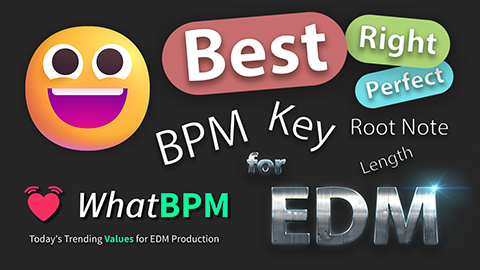-
-
Notifications
You must be signed in to change notification settings - Fork 10
FAQ
What is WhatBPM?
This is a daily updated information resource for EDM producers, answering questions such as what BPM / root note / key / track length to use for a new production, what labels to look at, what EDM genres are the most trending, and so on.
Please read the welcome section.
Do you have a video that quickly describes the project?
Sure, here you go:
Why does my EDM production need this?
Please read the welcome section too. In a nutshell, it increases your chances of being released on a label or included in the mix.
Where do you get the data from?
WhatBPM currently analyzes the Top 100 charts for each genre from Beatport. It turns out more than 3000 tracks daily. We may also consider analyzing the SoundCloud, Spotify, and Apple Music charts in the future.
Is WhatBPM also suitable for non-electronic music?
WhatBPM provides analytics only for EDM genres rotating on Beatport. But despite this, you can use this data for inspiration, education, and any other purposes.
What do you do if the number of tracks is the same for some values?
WhatBPM gives more weight to tracks with a higher position in the charts.
If 3 tracks from high positions have the A root note, and 3 tracks from low positions have the D# root note, then the A root note wins.
Yep, but the term "root note" is more widely used in the EDM community.
I see that you are only showing the 3 most commonly used values. How can I find out more?
Sure, here you go - latest.json. This file is updated daily.
Just feed it to a JSON beautifier.
Why do you count keys and root notes separately?
I decided to separate these concepts here, because sometimes you just need to know which root note to start producing from. And sometimes, you need to know exactly what is the most used key / scale.
What is 8A / 1m? This is the first time I have seen it.
These are the key values used in Harmonic Mixing. This is one of the fundamental mixing techniques of successful DJs.
-
8AisA minin the Camelot Wheel notation -
1misA minin Traktor's Open Key notation
These wheels are based on the classic Circle of Fifths.
In a nutshell, the idea is that close keys mix well with each other.
For example, 8A mixes well with 7A, 9A, and 8B.
This means that A min tracks mix well with D min, E min, and C maj.
You wrote that WhatBPM will be around forever. Is this true? What if you run out of funds?
Hosting and data updates are backed by GitHub completely free of charge for us.
This means that if me or my town is gone, WhatBPM will continue to work.
Read this Forever as as long as GitHub and Microsoft exist.
I still don't believe this will increase the success of my EDM production, I feel like you're selling me a dummy.
It will increase it. It is a fact, bro.
I've been working in EDM production since 2006, and I've seen so many good tracks rejected by DJs and labels. Especially in VA compilations!
It's a pain for a DJ when your track doesn't fit in terms of:
The 1st case is solved by WhatBPM.
The 2nd case can be solved by the correct arrangement in your DAW.
And the 3rd case can be solved by my other tool - Matchering.
You are fundamentally doing the wrong thing. First Matchering, now this. Your activity kills the uniqueness of artists' styles.
You can basically continue to live in your dreams, in which absolutely everyone needs your production like air. But the reality is that you need to take care of the quality, format, and usability of your EDM production.
WhatBPM and Matchering are created for promising EDM producers who do care.
Your own uniqueness and style can be successfully applied in melody composition, arrangement, sound design, and much more. And by adopting the generally accepted norms of your EDM genre, your music will become only more amazing. ✨
Not to mention how much time you can save, and devote your time to real art instead of going through the motions of a boring routine.
I've always produced drum & bass at 87 BPM. What the hell is 174? LOL
87 BPM and 174 BPM are the same from a musical point of view. Try multiplying 87 by 2. The source data contains tracks of both BPM values, although musically their tempos are identical. Therefore, we bring all BPM values to this range: from 91 to 182.
Your website looks like 💩 on my device.
You probably need to stop using Windows 7 or Internet Explorer. 🤷
I would like to use your data in my application, how can I do it?
Please go to the For Developers section.
How was WhatBPM made?
Please read this habr article.
How can I help your project?
You can help the project by buying me a coffee. ☕
Thank you!
Why did you choose Rust? Are you a hipster?
Rust is moe, bruh. It will surpass C/C+, as well as all sorts of GC languages. Yes, I'm a fanatic. 🤓
Looking for the automated reference mastering for your production?
A completely free open-source on-premise web application from the author of WhatBPM.
